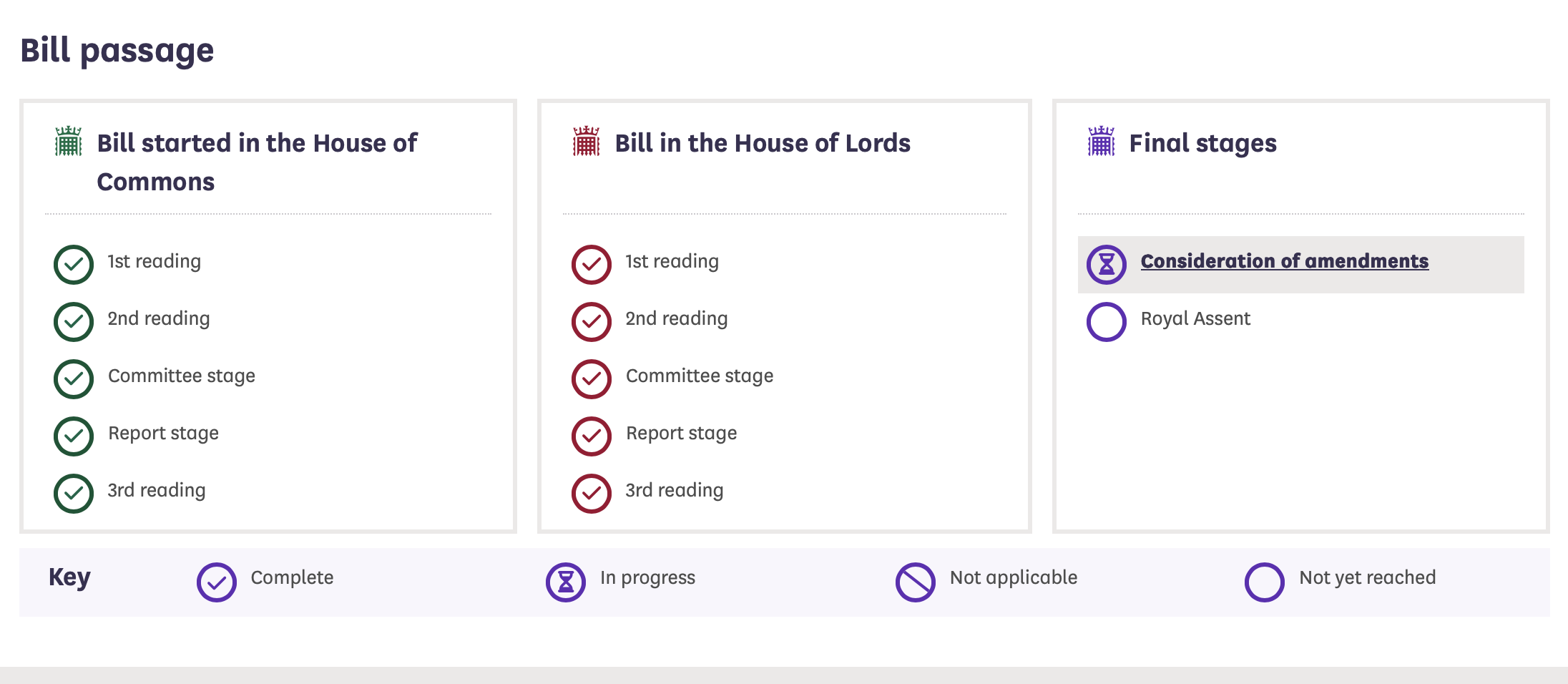
Lettings Legislation update
In the House of Lords, the report stage completed on 15th July 2025, the third reading took place on 21st July and now Parliament breaks for summer recess. Read on to find out the next steps and outcomes of the latest readings...
The Government were keen to enact the bill prior to the Parliamentary summer recess when first proposed in 2024. This has not been achieved, but it is expected that, upon Parliament’s return, the Government will seek to progress the Bill as quickly as it can. The timetable will depend however on the Government’s response to the Lords’ amendments and the extent of any further negotiation.
The below table show the passage through the parliament and current status as at the end of July 2025:

Summary of major changes for landlords:
- Section 21 ("no-fault") evictions abolished: Landlords must now rely on Section 8 grounds for possession, with tenants assured of greater stability and predictability.
- Fixed-term tenancies replaced by periodic tenancies: All ASTs will automatically roll on, giving tenants more security while allowing landlords flexibility to serve notice under Section 8.
- Rent increases limited to once per year, aligned to market rates and reviewable by first-tier tribunals to prevent mid-term hikes or "bidding wars."
- Rental bidding wars banned: Landlords must advertise a fixed asking rent and are prohibited from encouraging or accepting bids above that price.
- Tenant equality measures: Discrimination against tenants with children or on benefits has been banned, increasing fairness and accessibility.
- Decent Homes Standard + Awaab’s Law extended into private rentals: Landlords now must address hazards like mould and damp promptly, or face fines.
- Landlord registration and new ombudsman: Every landlord must register, and a dedicated ombudsman will handle disputes and enforce standards, empowering tenants and driving up compliance.
- Regulated rent review process: Rent can only be increased annually, with tenants empowered to challenge via tribunal procedures.
House of Lords—Third Reading, 21 July 2025
Objective: At Third Reading, Lords focused on tidying-up rather than rewriting. The stage is typically used to catch minor errors, clarify ambiguous sections, and ensure the bill is effective and loophole-free.
Passed: Two final amendments specifically relating to rent in advance and the role of the ombudsman were approved to wrap up the bill before sending it back to the Commons.
Key debate topics included:
Court resources & legal aid: Peers voiced serious concerns that with Section 21 abolished, more evictions will travel through Section 8 proceedings, likely slowing processes and putting pressure on courts. Amendments calling for formal judicial readiness reviews were discussed, though not formally adopted. Many government ministers pledged MoJ involvement and backing a legal advice framework.
Housing standards enforcement: Further adjustments included alignment with Awaab’s Law (requiring landlords to address hazards promptly), student accommodation grounds, and a cap on advance rent payments.
Transparency tweaks: Lords refined clauses around rent-in-advance provisions, tribunal backdating powers, and HMO/student let grounds which we summarise below.
Student accommodation:
Purpose-Built Student Accommodation (PBSA) has now been carved out, allowing fixed terms going forwards. However, existing PBSA tenancies will become periodic but benefit from a special possession ground allowing landlords to terminate the lease in time for the new academic year from September each year.
Houses in Multiple Occupation (HMOs) will have their own possession ground to cope with student turnover. The Lords added an amendment to extend this to all student tenancies, not just HMOs, but it remains uncertain whether this will be retained when considered by the Commons at the nest stage.
Pets in lets update:
A tenants request for a pet can't be unreasonably refused under the bill. The original proposal to require tenants take out pet insurance has been dropped, and the debate now centres on whether landlords can ask for an extra three weeks' rent as a pet deposit.
Backdating rent increases:
Where tenants seek to challenge a rent increase with the Tribunal there was no right for the landlord to backdate it to the original proposed date. This could result in an increase of tenants challenging rent increases to buy more time while the tribunal makes a decision. While this Labour amendment does not go so far as many have hoped for in granting the Tribunal the immediate power to backdate rent increases, it does simplify the legal process for the Secretary of State to do so in the future if, like anticipated, there is a flood of rent challenges due to inability to award back dated rent.
Rent in advance:
A Government backed amendment allows that existing agreements in place for advance rent (such as payment at yearly intervals) will not be affected following commencement of the provisions limiting rent payments to monthly intervals.
Landlords regaining possession under Ground 1A:
A new ground for possession 1a which will allow landlords to seek possession if they wish to sell the property was originally accompanied by a prohibition on re-letting an unsold property for 12 months. A Conservative amendment seeks to reduce this period to six months.
Next Steps: Commons Review, September 2025
Parliament returns from summer recess on 8th September 2025 which is the current provisional date that the Commons review (also known as Ping-Pong) will consider the Lords’ amendments. They may reject, amend further, or accept- if disagreements arise, it’ll bounce back to Lords. The government will hope to achieve Royal Assent before the conference recess starts on September 16th.
Royal Assent: Expected soon after, likely before MP conference recess around mid-September.
Start date: Most provisions (abolishing Section 21 and ending fixed‑term ASTs) should begin in early 2026, though final commencement relies on secondary regulations. It is likely other changes will take longer to implement as the landlord database etc are yet to be developed.
Why this matters for landlords
- Immediate preparation time: With the bill taking a summer pause, conscientious landlords have a few more weeks to review tenancies, referencing, and property standards. There is still time to serve a Section 21 notice on any fixed tenancies approaching the end of the fixed term or on a periodic.
- Court backlog warning: Eviction through Section 8 grounds may now take 6–9 months or longer, so staying proactive is paramount. We would also recommend landlords have rent guarantee insurance cover in place and/or legal expenses.
- Handover and implementation: Lords' final revisions aim to preserve workable structures, including student tenancy and advance rent rules- mitigating unintended disruption. We will wait to see how this materialises but now is a critical time to be working with a reputable letting agent.
Further reading:
If you are interested in learning more about the bill please review our previous content including:
To read the full Bill on the Government Website please click here.
